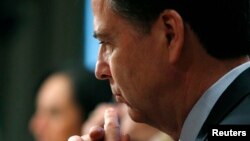The radicalization of Americans by Islamic State and other groups, particularly through sophisticated use of social media, is a top concern for the FBI as it grapples with evolving terrorism threats, Director James Comey said Thursday.
Like other militant groups, Islamic State, also known as ISIL, IS, and ISIS, has called for lone-wolf attacks in Western countries and has specifically encouraged attacks on soldiers, law enforcement officers and the intelligence community, Comey said at a Senate appropriations subcommittee budget hearing.
Comey referred to the group's efforts to recruit Americans to join Islamic State fighting in Syria and Iraq, then have them return to the United States to commit acts of terrorism.
"ISIL's widespread reach through the Internet and social media is most concerning as the group has proven dangerously competent at employing such tools for its nefarious strategy," Comey told the panel as he presented his $8.48 billion budget request for fiscal 2016. "This poses an enormous challenge to us: to find the people who are responding to that siren song."
National Intelligence Director James Clapper said this month that about 180 Americans had traveled to Syria to join Islamist militants and about 40 had returned to the United States. Comey called the threats posed by such foreign fighters and from homegrown violent extremists "extremely dynamic." He did not cite updated figures on American foreign fighters before the panel recessed to go into classified session.
Senator Dianne Feinstein, a California Democrat, asked Comey about a more tangible piece of that threat: that known or suspected terrorists are not banned from buying guns in the United States. She cited a Government Accountability Office report saying that from 2004 to 2014, 91 percent of the 2,233 known or suspected terrorists on the federal terrorism watchlist who tried to buy a firearm were successful in passing a background check.
"We can have people come into this country meaning to do us harm and they can go in and buy a weapon to carry it out. That's simply unacceptable," said Feinstein. "Your biggest concern is the lone wolf. The lone wolf can come in unarmed, he can buy the explosives, he can buy the gun. This must be stopped."
She asked where the Obama administration stood on legislation to prevent the sale of firearms and explosives to people on the watchlist. Comey replied that he did not know.





